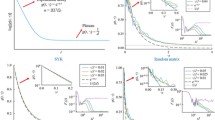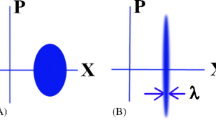Abstract
We address the analysis of the following problem: given a real Hölder potential f defined on the Bernoulli space and μ f its equilibrium state, it is known that this shift-invariant probability can be weakly approximated by probabilities in periodic orbits associated to certain zeta functions.
Given a Hölder function f > 0 and a value s such that 0 < s < 1, we can associate a shift-invariant probability ν s such that for each continuous function k we have
, where P(f) is the pressure of f, Fix n is the set of solutions of σ n(x) = x, for any n ∈ ℕ, and f n(x) = f(x) + f(σ (x)) + … + f(σ n−1(x)).
We call νs a zeta probability for f and s, because it can be obtained in a natural way from the dynamical zeta-functions. From the work of W. Parry and M. Pollicott it is known that ν s → µ f , when s → 1. We consider for each value c the potential c f and the corresponding equilibrium state μ cf . What happens with ν s when c goes to infinity and s goes to one? This question is related to the problem of how to approximate the maximizing probability for f by probabilities on periodic orbits. We study this question and also present here the deviation function I and Large Deviation Principle for this limit c → ∞, s → 1. We will make an assumption: for some fixed L we have limc→∞, s→1 c(1 − s) = L > 0. We do not assume here the maximizing probability for f is unique in order to get the L.D.P.
Similar content being viewed by others
References
G. Atkinson. Recurrence of co-cycles and random walks, The Journal of the London Mathematical Society 13 (1976), 486–488.
A. Baraviera, A.O. Lopes and P. Thieullen. A large deviation principle for equilibrium states of Hölder potencials: the zero temperature case, Stochastics and Dynamics 6 (2006), 77–96.
T. Bousch. Le poisson n’a pas d’arêtes, Annales de l’Institut Henri Poincaré, Probabilités et Statistiques, 36 (2000), 489–508.
X. Bressaud and A. Quas. Rate of approximation of minimizing measures, Nonlinearity 20(4) (2007), 845–853.
J.R. Chazottes and M. Hochman. On the zero-temperature limit of Gibbs states, preprint (2009).
G. Contreras, A.O. Lopesand Ph. Thieullen. Lyapunov minimizing measures for expanding maps of the circle, Ergodic Theory and Dynamical Systems 21(2001), 1379–1409.
J.P. Conzeand Y. Guivarc’h. Croissance des sommes ergodiques et principe variationnel, manuscript circa (1993).
A. Dembo and O. Zeitouni. Large Deviation Techniques and Applications, Springer Verlag (1998).
B.R. Huntand G.C. Yuan. Optimal orbits of hyperbolic systems. Nonlinearity 12 (1999), 1207–1224.
O. Jenkinson. Ergodic optimization. Discrete and Continuous Dynamical Systems, Series A 15 (2006), 197–224.
R. Leplaideur. A dynamical proof for the convergence of Gibbs measures at temperature zero. Nonlinearity 18(6) (2005), 2847–2880.
A.O. Lopes, J. Mohr, R. Souza and Ph. Thieullen. Negative Entropy, Pressure and Zero temperature: a L.D.P. for stationary Markov Chains on [0, 1], Bull. Soc. Bras. Math. 40(1) (2009), 1–52.
R. Mañé. Generic properties and problems of minimizing measures of Lagrangian systems, Nonlinearity 9 (1996), 273–310.
I.D. Morris. A sufficient condition for the subordination principle in ergodic optimization, Bull. Lond. Math. Soc. 39(2) (2007), 214–220.
W. Parry, Equilibrium states and weighted uniform distribution of closed orbits. Dynamical systems (College Park, MD, 1986–87), Lecture Notes in Math, 1342, Springer, Berlin, (1988), 617–625.
W. Parry and M. Pollicott. Zeta functions and the periodic orbit structure of hyperbolic dynamics, Astérisque 187–188 (1990).
F. Spitzer. A Variational characterization of finite Markov chains. The Annals of Mathematical Statistics. 43(1) (1972), 303–307.
Author information
Authors and Affiliations
Corresponding author
Additional information
Partially supported by CNPq, PRONEX — Sistemas Dinâmicos, INCT em Matemática, and beneficiary of CAPES financial support.
Supported by CNPq — Brazil — Ph.D. scholarship.
About this article
Cite this article
Lopes, A.O., Mengue, J.K. Zeta measures and Thermodynamic Formalism for temperature zero. Bull Braz Math Soc, New Series 41, 449–480 (2010). https://doi.org/10.1007/s00574-010-0021-0
Received:
Published:
Issue Date:
DOI: https://doi.org/10.1007/s00574-010-0021-0




